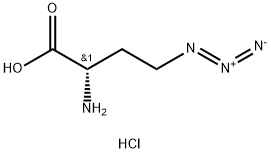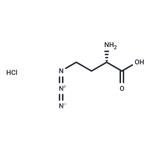L-Azidohomoalanine (AHA) is an amino acid analog of methionine that contains a very small modification, specifically an azido moiety. This compound can be fed to cultured cells and incorporated into proteins during active protein synthesis. Detection utilizes the chemoselective ligation or “click ” reaction between an azide and an alkyne or cyclooctyne. For example the azido-modified protein can be detected with either fluorescent alkyne or biotin alkyne. Detection sensitivity with these reagents in 1-D gels and Western blots is in the low femtomole range and compatible with downstream LC-MS/MS and MALDI-MS analysis.

